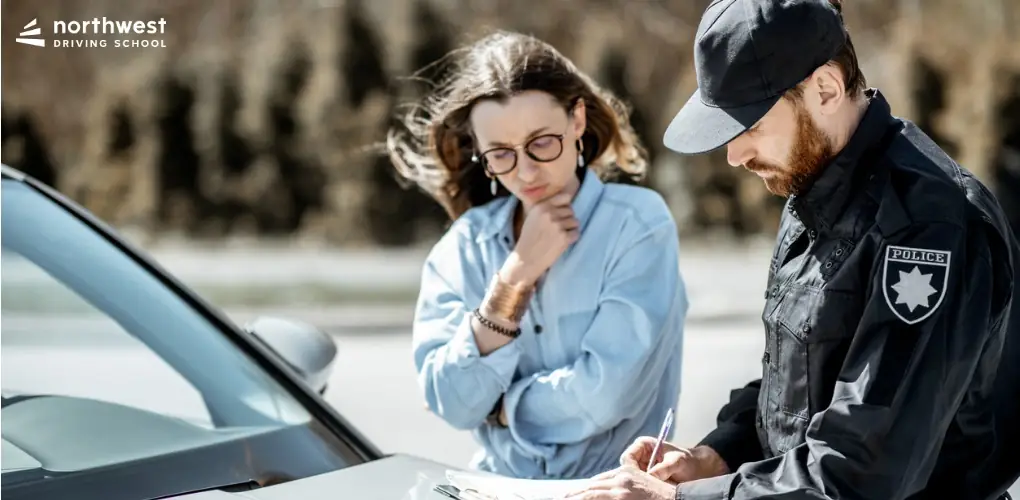- Driving School
What To Do During A Traffic Stop?

When driving, one of the most severe events you could encounter is a traffic stop. It is essential for drivers to know how to act during this situation: it can help keep them safe and protect their rights.
Following proper protocol with an officer will allow them to navigate such a scenario quickly and seamlessly. In this article, we’ll discuss what steps you should take during a traffic stop to ensure your experience goes as smoothly as possible.
Table of Contents
- Keep Your Hands On The Wheel And Wait For Instructions From The Officer
- Be Polite And Respectful And Follow Directions Given By The Officer
- Do Not Argue With The Officer Or Try To Explain Your Situation
- Do Not Make Any Sudden Movements – Keep Your Hands In Sight At All Times
- Stay Calm And Answer Questions Honestly
- Know Your Rights – You Do Not Have To Consent To A Search Of Your Vehicle Or Personal Belongings
- If You Are Asked To Get Out Of The Vehicle, Do So Slowly And Carefully
- Document As Much As Possible During The Encounter (E.g., Badge Number, License Plate Number)
- Learn To Drive In Nevada Today!
Keep Your Hands On The Wheel And Wait For Instructions From The Officer
When you see those flashing lights in your rearview mirror, it can be a nerve-wracking experience. However, it’s crucial to keep your hands on the wheel and wait for instructions from the officer.
This shows respect for the law and keeps everyone involved safe. If you need to reach for your license and registration, inform the officer beforehand and ask for their permission. Remember that the officer is just trying to do their job, and cooperating with their instructions can go a long way in making the situation as smooth as possible.
Remember, safety should always be your top priority.
Be Polite And Respectful And Follow Directions Given By The Officer
When interacting with law enforcement, it is crucial to remember to be polite and respectful, and follow any directions given by the officer. This not only ensures a safe and peaceful interaction but also demonstrates a level of maturity and responsibility on your part.
Giving attitude or failing to comply with instructions can quickly escalate the situation and lead to unnecessary consequences. Remember, an officer’s job is to protect and serve the community, and complying with their requests can make their job easier and safer for both parties involved.
Read More: How Should Beginners Approach Driving in Heavy Traffic for the First Time?
Do Not Argue With The Officer Or Try To Explain Your Situation
If you ever find yourself in a situation where you are being pulled over by an officer, it is essential to remain calm and composed. Even if you disagree with the reason for being pulled over or feel that you have a valid explanation for your actions, it is not in your best interest to argue with the officer or try to explain your situation.
This can escalate the situation and result in severe consequences. Instead, it is recommended to cooperate with the officer and follow their instructions. By remaining respectful and compliant, you may be able to reduce the severity of any potential consequences. Remember, it is always better to err on the side of caution during a traffic stop.
Do Not Make Any Sudden Movements – Keep Your Hands In Sight At All Times
In situations where tensions are high, it’s important to remember to keep your cool. A critical aspect of this is being mindful of your movements. Even innocent gestures, like reaching for your phone, can be misinterpreted and could escalate a situation. To avoid any misunderstandings, it’s crucial to keep your hands in sight at all times.
This shows that you have nothing to hide and helps maintain a level of trust between you and whoever you’re interacting with. So next time you’re in a heated or potentially dangerous situation, remember to keep your hands visible and avoid sudden movements.
Stay Calm And Answer Questions Honestly
In any situation, it’s essential to stay calm and answer questions honestly. This rings especially true when dealing with law enforcement or legal proceedings. While the temptation to lie or deflect may be strong, doing so can only make matters worse.
Not only is providing false information a criminal offense, but it can also harm your case in the long run. Being truthful and transparent shows that you have nothing to hide and can help prevent misunderstandings. So if you’re ever faced with a difficult question, take a deep breath, compose yourself, and respond truthfully. It may not be easy, but it’s the right thing to do.
Know Your Rights – You Do Not Have To Consent To A Search Of Your Vehicle Or Personal Belongings
It’s essential to know your rights when it comes to searches of your vehicle or personal belongings. Many people aren’t aware that they don’t have to consent to a search, even if law enforcement officers ask.
Your possessions are your own, and you have the right to privacy. Remember that it’s always okay to ask questions, and you don’t have to be confrontational. Simply ask if the officer has probable cause for a search, or if they have a warrant. Knowing your rights can help protect you from potential violations.
If You Are Asked To Get Out Of The Vehicle, Do So Slowly And Carefully
In any situation where you are asked to leave your vehicle, it’s important to proceed slowly and with caution. Whether you’re pulled over by law enforcement or involved in an accident, getting out of your vehicle too quickly or carelessly can put you in danger.
Take the time to assess your surroundings and any instructions given to you before slowly unbuckling your seatbelt and opening your door. Once you’re out of the car, be mindful of any potential hazards, like passing cars or uneven terrain. By prioritizing your safety in these tense moments, you can help ensure that you and those around you remain protected.
Document As Much As Possible During The Encounter (E.g., Badge Number, License Plate Number)
During any encounter you have with law enforcement, it’s essential to document as much information as possible. This includes details like their badge number or license plate number. While it may seem unnecessary at the moment, having this information could prove valuable later on.
Whether it’s for legal purposes or simply to jog your memory, having these details documented could be the difference between a successful outcome and a frustrating one.
So next time you find yourself in an encounter with someone, take the time to jot down any relevant information. It may just come in handy down the road.
Learn To Drive In Nevada Today!
The Northwest Driving School and Traffic School provides the Las Vegas community with live driving and traffic classes taught by seasoned instructors. All of our driving instructors have passed background checks.
Each automobile is DMV safety-approved, and every member of the Northwest family is committed to providing excellent driver’s education and behind-the-wheel instruction.
At Northwest, you can expect to find outstanding classes, both on campus and behind the wheel, that are engaging, fact-filled, entertaining, and geared toward success.
We make no bones about it; we believe that Northwest provides the best driving lessons in Las Vegas, no matter your age or background. We are proud of the fact that 98% of our students pass their tests on the first try. Call us at (702) 212-5667 to start your driving adventure with one of our expert instructors.




